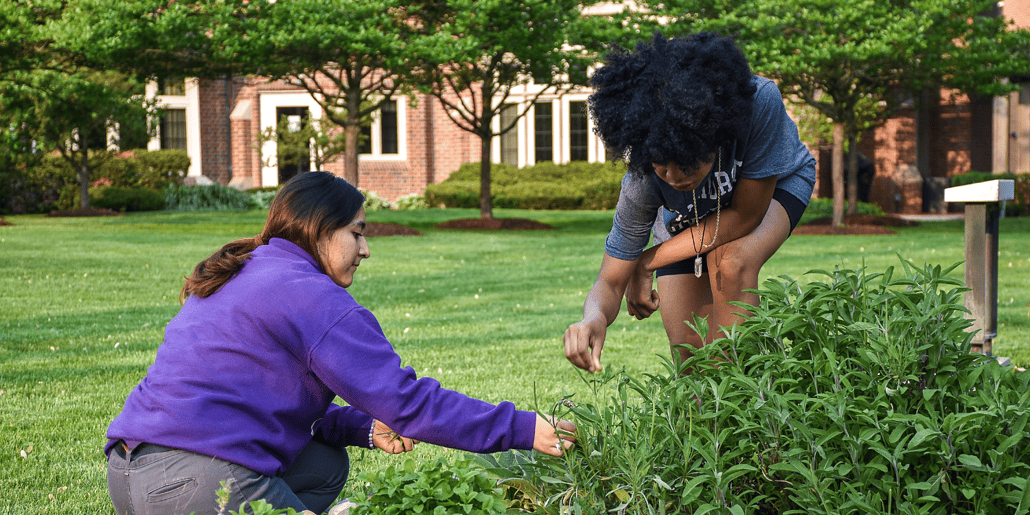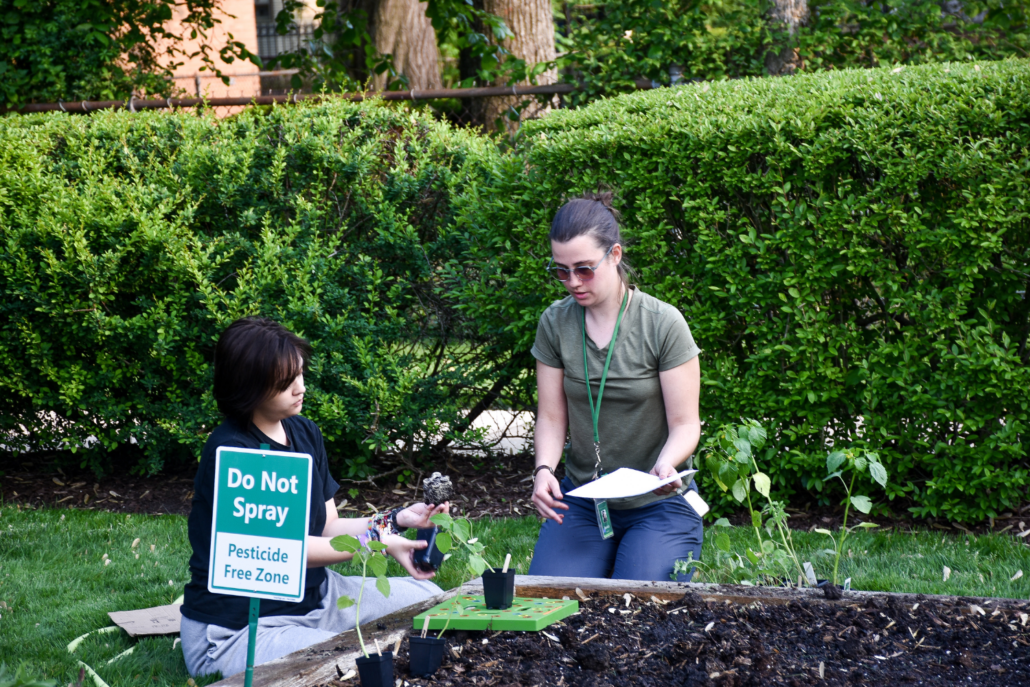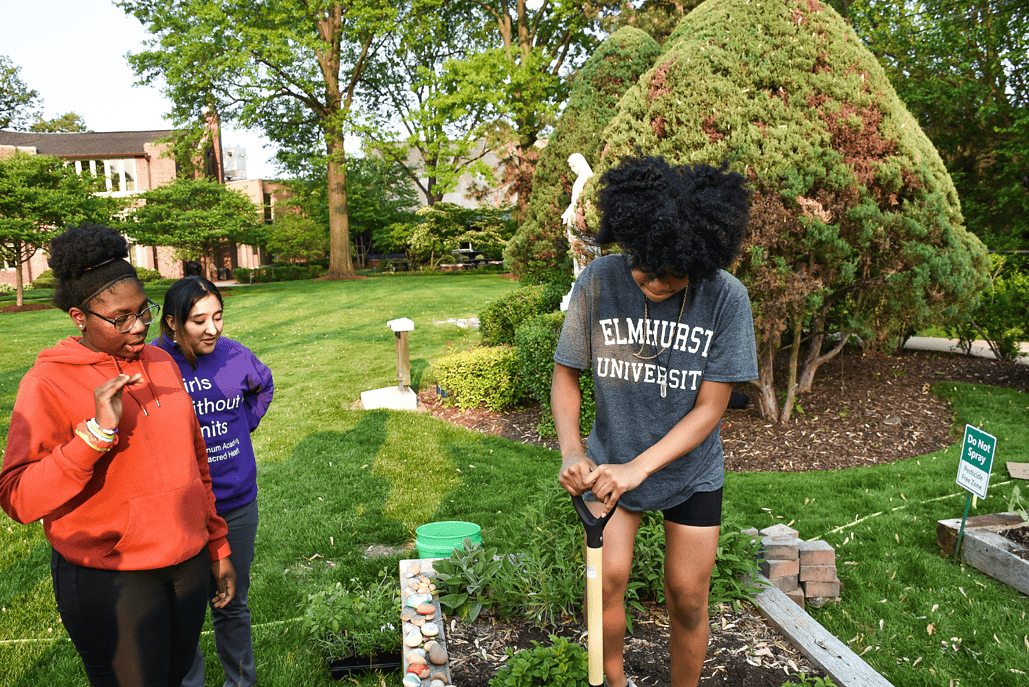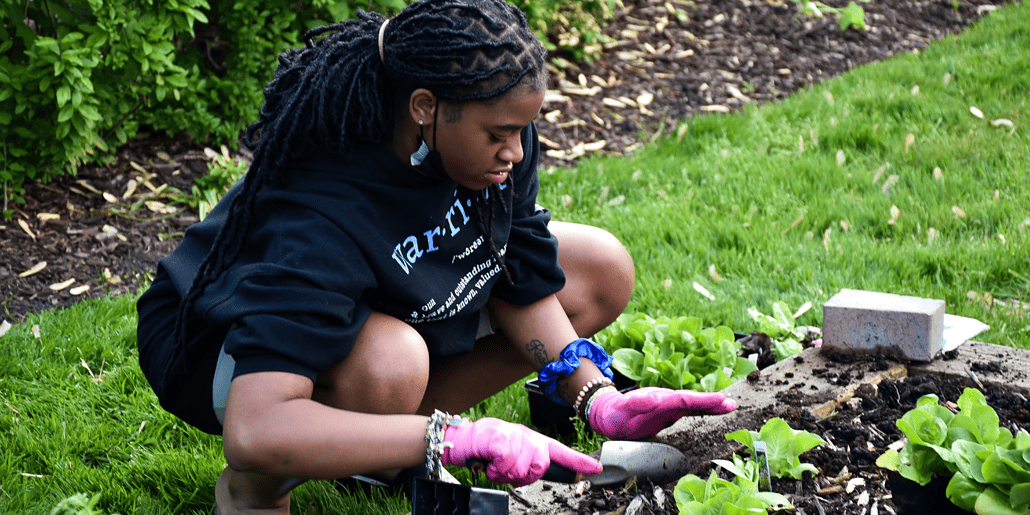Academic Awards Celebrate Successful School Year
The conclusion of the school year gave Mercy Home the opportunity to celebrate our young people’s academic and professional achievements...
July 9, 2025
June 15, 2023
When the young women at our Walsh Campus gather for Garden Club every other Thursday, they work on more than just sewing seeds. Jessica Mueller, the head of Garden Club and a former youth care worker at Mercy Home, said that they also use the garden to reflect on how they can grow as people.
Mueller said that the young women started seedlings and planted them in the garden while keeping journals describing what each seed represented. One wrote that she was planting a seed of confidence and that talking to the plant would help it grow.
“They’re also setting intentions for themselves and planting a seed within themselves that is symbolic, that as the garden grows, so can this intention within them,” Mueller said. “They can watch that grow with the garden.”

Garden Club doesn’t just operate during the warmer months. The club first meets in February to create a plan for the garden and discuss what its members would like to grow. In March they begin planting seeds and doing activities that correlate with gardening, such as cooking. This summer, they’ve begun growing carrots, lettuce, onions, kale, and basil.
“A lot of times kids don’t have the opportunities to [do things like this] … they’re told a lot of things they can’t do, but not always given something to plug in to what they can do,” Mueller said. “It’s really an opportunity to nurture and grow in decision making. They’ve picked exactly what we’re planting, and they’ve gotten to collaborate and do team building.”
Garden Club begins late in the afternoon. Mueller gave the young women grapes and designated one to serve as the photographer for the day, documenting the planting process.
Another important task for the club is hiring an assistant to Mueller. This person tends to the garden in the days in between the club’s meetings. Last year, a young woman named Tiera served in that role and this year, she’s mentoring her successor.
Tiera first learned to garden in a class she took at school. She decided to apply because to her, gardening feels more like comfort than work.
“Gardening is definitely a coping skill because it’s outside and there’s fresh air,” Tiera said. “It’s relaxing. Sometimes I feel like, ‘is this really a job?’”


“There’s a comfort of also seeing the kids who have been here multiple years [who] can also set the tone and model that it’s okay to get dirty or that it’s okay to like bugs,” Mueller said. “They’re familiar with it. That’s one of the main things that I’ve seen. A willingness to get dirty and try something new or eat something straight out of the garden and try different foods because they know that they’ve grown them.”
Mueller’s own background isn’t in horticulture. Gardening initially started as a hobby, but she saw an opportunity to implement a biweekly club at Mercy Home in addition to her full-time job as a counselor at another organization.
The club keeps Mueller remained connected with Mercy Home where she worked following her graduation from Elmhurst College. While at the Home, she developed a support group for children who were affected by a parent or caregiver’s addiction.
“She’s definitely a good mentor,” Tiera said. “[She’s] always showing us different ways to incorporate things into our lives.”
Therapeutically, Mueller said that the garden can build self-esteem because the girls know that they’ve built something beautiful. The garden is also used as sensory stimulation and can help the kids cope and calm themselves. They grow lambs’ ear because it feels fuzzy and experiment with different herbs for their smells.

“I think it would be a missed opportunity to just focus on the technical gardening skills in a residential treatment center setting,” Mueller said. “I don’t expect everyone here to want to run away and be a gardener. But how can they use it to talk about their family’s connection to food, to land and to use gardening as an opportunity to connect and check in with themselves.”
Mercy Home always looks for unique ways to help our young people heal and grow. And we are grateful to caring mentors like Jessica Mueller who cultivate our young people’s strengths and hopes for their futures.
The conclusion of the school year gave Mercy Home the opportunity to celebrate our young people’s academic and professional achievements...
July 9, 2025
Following the last day of classes for Chicago Public Schools, our young people were greeted by Hope and Poppy, two...
July 9, 2025
At Mercy Home, we stress the importance of giving back to the community. Some of our young men spent a...
June 26, 2025
Comments